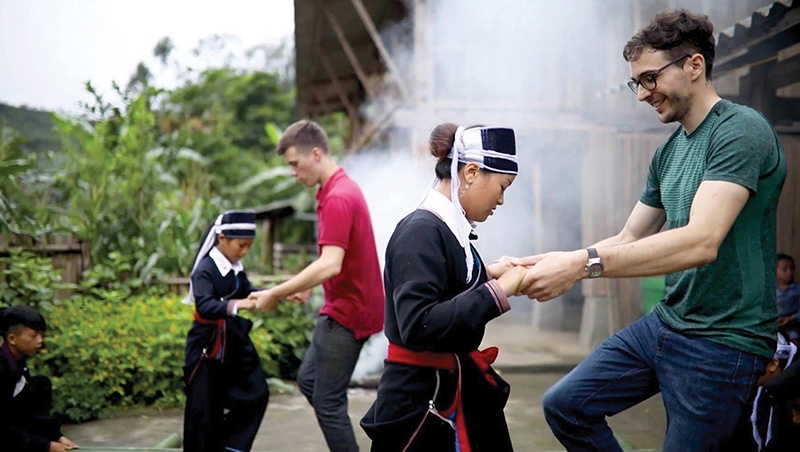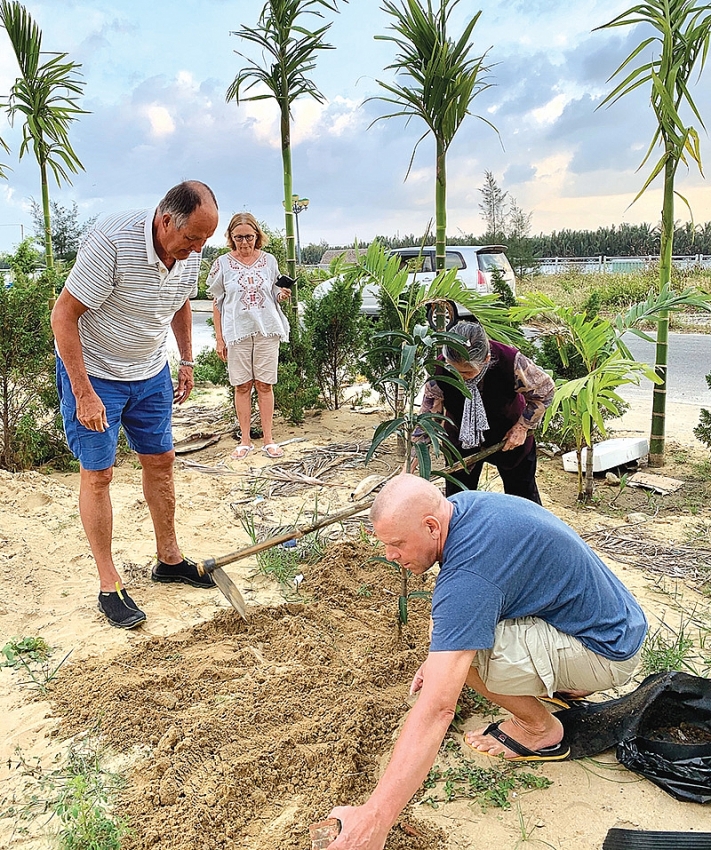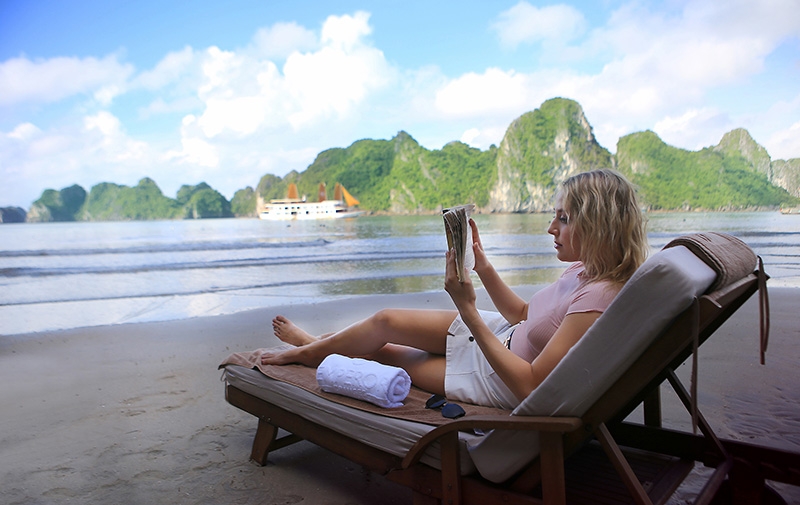The hotel industry manages to overcome the crisis
 |
| The hotel industry manages to overcome the crisis |
HOTELS CLOSED TO SAVE COSTS
As the first 4-star resort in Yen Bai province newly established in October 2019, Le Champ Tu Le Resort used to have an occupancy rate of 70-80 per cent. However, this success did not last long. When the pandemic appeared, the number of bookings decreased and eventually stopped completely since social distancing measures were issued. Nearly one month without any revenue, Duc Long, owner of Le Champ Tu Le Resort, said he had cut 30 per cent of the manager’s salary, gave employees a rotating leave, and temporarily closed the resort till the end of June, waiting for the disease to be under control and tourism to recover before reopening. “We have considered the plan to only operate three weekends to serve domestic tourists on vacation, or pause completely until the end of June. Currently, I am considering the second option because the number of visitors is still unstable,” he said.
Long’s concerns are similar to the anxiety of thousands of people who are doing business in the hotel industry in Vietnam today. The sudden breakdown of the inbound tourist market has completely stunned the industry since the end of March. Meanwhile, domestic tourists have not been able to travel due to restrictions on movement and social distancing. Many hotels had to close in February, others tried to maintain operations by reducing room rates by 50-60 per cent but also had to eventually shut down from mid-March as there were no more guests. Pham Thi Hang, owner of the Hanoi Emerald Waters Hotel in Hanoi’s Old Quarter, said she had to make the difficult decision to close the hotel, temporarily giving employees a break from work with a subsidy of VND1.5 million per month. This amount will be paid once in August, when the hotel returns to normal operation.
The fastest and most effective option for many small- and medium-sized hotels is the shutdown to save operating costs, reduce staff and wages, and then restructure the business model, focusing on developing a digital platform and taking advantage of training time to prepare for a stronger return after the epidemic. Some high-class hotel brands such as Banyan Tree and Marriott also take advantage of the opportunity to build and strengthen relationships with customers by sending notifications about their prevention efforts to them, while introducing deals in the near future.
Although facing many difficulties, some other hotels are determined not to cut wages out but to find other solutions. Muong Thanh has co-operated with travel agencies and airlines to offer stimulus products, flight ticket combos, and hotel rooms at preferential prices, as well as attractive discounts for loyal customers. Nguyen Anh Tuan, director of Muong Thanh Grand Hanoi Hotel, said “We encourage our employees to use their leave days or to work in other areas such as serving conferences and seminars.”
 |
CHANGES TO ADAPT
However, there are also hotels that find more creative solutions, proactively diverting to save themselves. Nearly 160 hotels and resorts have registered to become free or paid isolation centres during the pandemic. The owner of Hanoi Emerald Waters Hotel also voluntarily used his premises as a quarantine place on the call of Hanoi city’s authority. Hotels selected for free isolation will receive electricity and water subsidies from the state, which will help them save operating costs. Some hotels, such as Hoi An Beach Resort, Sun & Sea Resort (Hue), and Mangrove Can Gio Hotel (Ho Chi Minh City), provide isolation service packages for foreigners. These packages include affordable room rates, meals, and other service fees, also bringing some profit for the hotel.
 |
In Hanoi, the three 5-star hotels Pullman Hanoi Hotel, Pan Pacific Hotel and Crowne Plaza Hotel are arranged to offer accommodation for flight crews of foreign airlines entering Hanoi to ensure the prevention of COVID-19 infection.
Elsewhere, some 4-to 5-star hotels are focusing on home catering for customers. As such, JW Marriott Hanoi, Lotte Hotel, and Fortuna Hanoi, among others, launched these services in late March and early April. JW Marriott Hanoi will serve their meals door-to-door with prices starting from VND750,000. Metropole Hanoi’s restaurant also delivers products starting at VND1.9 million. Park Hyatt Saigon also opened a chef service to cook dishes to be delivered to customer’s homes. Tran Minh Hanh, deputy director of Grand Saigon Hotel, said the on-site delivery at this time creates a sense of intimacy and safety, helping the hotel connect closely with guests and make a good impression for when the pandemic is over.
Besides these temporary solutions, longer and more reliable steps are also being considered by hotel owners. From the experience with SARS, many experts believe that the domestic tourist market is likely to recover after two months, while the international tourist market takes about six months. Therefore, some investors have planned to expand the scale by acquiring private hotels for sale at reasonable prices. After a period of 1-2 months of renovation, these hotels can go into operation when the domestic tourism market starts to stabilise, with more time for promoting activities and building new products to welcome international visitors in the last months of 2020.
Bobby Nguyen, CEO of Mekong Rustic, said that May will be the time for many investors to buy because after a few months of losses, many small hotels will reduce their size and want to sell to cut losses. He is also planning to find a few ecolodges to discuss co-operations or acquisitions. Bobby is confident that the tourism market will recover quickly, starting from the domestic market in Ho Chi Minh City and the southern provinces. By June, Vietnam’s hospitality industry will probably welcome more arrivals from Northeast Asian markets such as Hong Kong, Taiwan, and South Korea, while European visitors must wait until October. “About 80 per cent of Mekong Rustic’s visitors in the summer are Vietnamese. It is also the time when the West prepares for the fruit season. We expect to sell more culinary experience packages to Vietnamese guests.”
At this time, Saparis hotels and Sapa Eco-home Mountain Retreat of Lu A Tau at Sapa have started to receive the first bookings for some domestic customers, while many European customers who booked before the outbreak have not been cancelled. The owners were initially very worried and thought that the epidemic would cause them to lose everything. However, the first rays after the gloomy days made them more confident. “I will be ready to start all over, because there is no stopping point in this circle of life”, one of them said.
What the stars mean:
★ Poor ★ ★ Promising ★★★ Good ★★★★ Very good ★★★★★ Exceptional
 Tag:
Tag:
Themes: Vietnam Tourism Upswing
Related Contents
Latest News
More News
- Marriott signs major deal to expand luxury hotel footprint in Vietnam (February 04, 2026 | 15:58)
- Welcome Year of the Horse at Four Seasons Resort The Nam Hai (January 30, 2026 | 16:18)
- The Grand Ho Tram to host the first-ever IBF convention in Southeast Asia (January 29, 2026 | 12:18)
- Danang Marriott ushers in Lunar New Year by the sea (January 28, 2026 | 11:42)
- Angsana and Dhawa Ho Tram offer a serene Lunar New Year retreat (January 23, 2026 | 23:38)
- Tides of Heritage: A Tet speciality at InterContinental Phu Quoc Long Beach (January 20, 2026 | 12:08)
- Muong Thanh launches Lunar New Year gifts inspired by tradition (January 16, 2026 | 16:41)
- The Grand Ho Tram seeks responsible entertainment with pilot casino access (January 16, 2026 | 10:56)
- Ocean Resort by Fusion Quy Nhon launches Lunar New Year 2026 package (January 15, 2026 | 11:11)
- Regent Phu Quoc announces general manager appointment (January 15, 2026 | 11:06)






















 Mobile Version
Mobile Version